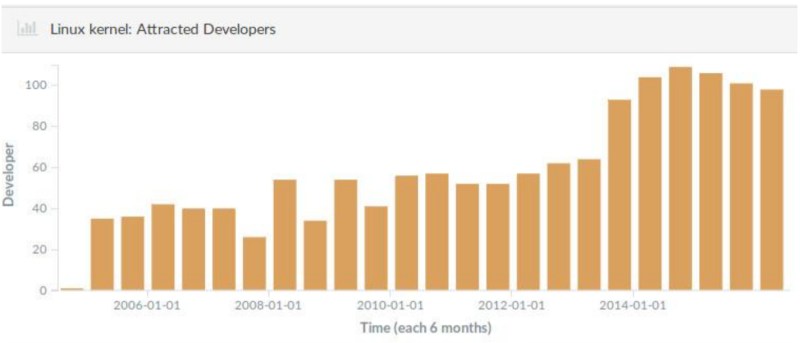On the 8th of October we joined LinuxCon to share our Gender Diversity Analysis of technical contributions to the Linux Kernel.
We are aware of the diversity gap in the tech industry and the efforts of some institutions, like Linux Foundation, are doing to solve it. So, we decided to add our five cents, working over the weeks to bring some stats about women’s contribution to Linux Kernel.
Before diving deep into our results, let’s take a look at some data we already have from the tech sector. Women represent:
- 30-40% of tech companies workforce
- 10-20% of tech teams
- 5% of CEO positions
- 21% of middle level/roles
- 32% of junior roles
- 11% of OpenStack population, according to our previous analysis
Women’s contribution to Linux Kernel
Analyzing git activity and population, women are 9,9% of the population and responsable for 6,8% of the activity. But last year, despite the woman population has increased by 2 points, the contribution has only boosted 1,5 more.


Trend evolution has maintained over the years, but there are two peaks in 2014 and 2016. We are still looking for a reason.
Pondering 2014, and what worked well that year…. hmm. More of it certainly needed. Thank you for this analysis @Bitergia ! https://t.co/PHHez66CRy
— Kate Stewart (@_kate_stewart) 7 de octubre de 2016
We have analyzed the mailing lists activity, looking for code review related emails, finding that the commits reviewed by women are between 4% and 6%. Merging code reviews are acked by women in a 3%-10%.
Woman population in Linux Kernel was boosted by 110 developers in 2014 and 2015.
We have also analysed community demography (how contributors join and leave), especially women. In fact, we have discovered that in 2013, 64 developers did their first commit to the Linux Kernel project, but 35 left during following semester, and just 12 are still contributing. It’s a good idea to build a kinder environment in developers communities in order to retain more people, especially women.

Conclusions and Potential Actions.
Diversity is important. There are several reasons for that, as Nithya Ruff said in LinuxCon:
- It’s a Human Rights question. Technology assumption allows empowerment and reduce the gender tech gap. Technology is running the world and is unfair to exclude any part of the population, such as women.
- Diversity brings better economic results to firms. As many studies have published, diversity is correlated to better benefit results.
We have discovered so many threads during the research, finding a correlation between gender initiatives in tech industries and the growing number of women.
To close the article, we would encourage Linux Foundation in all gender initiatives which they are performing, with the strong believe that they are building a better world.
You can join the full presentation that Daniel Izquierdo performed, and if you are interested in running or sponsoring similar analysis for other communities or projects, just let us know!








